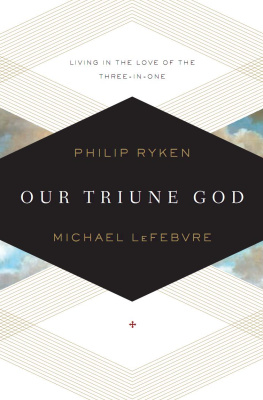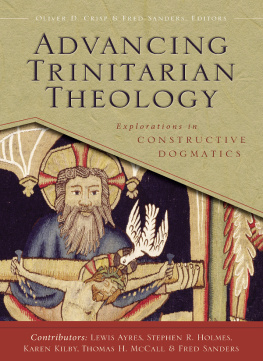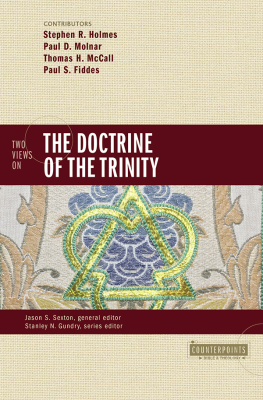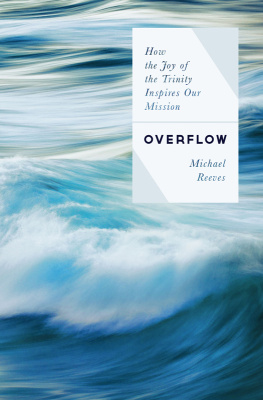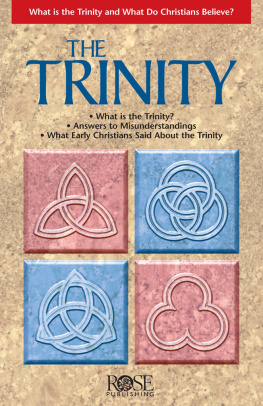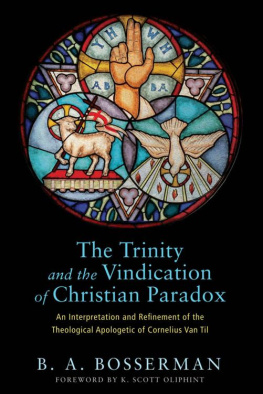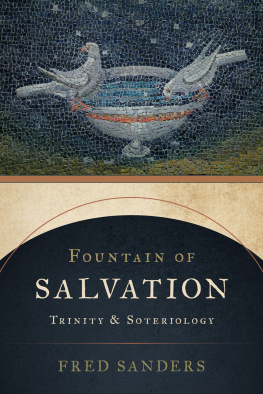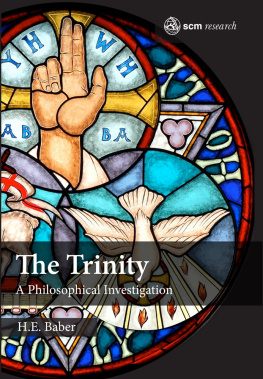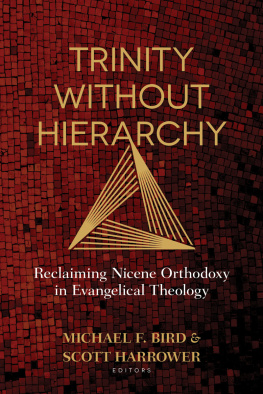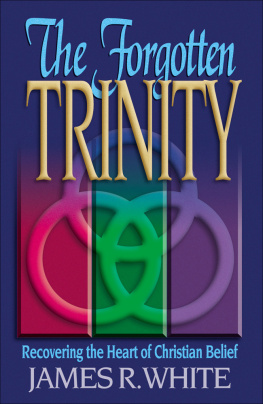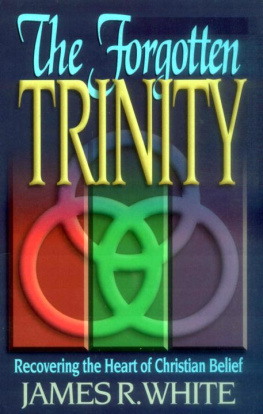Philosophical and Theological Essays
on the Trinity
Thomas McCall
and
Michael Rea
- Great Clarendon Street, Oxford OX2 6DP
- Oxford University Press is a department of the University of Oxford.
- It furthers the University's objective of excellence in research, scholarship,
- and education by publishing worldwide in
- AucklandCape TownDar es SalaamHong KongKarachi
- Kuala LumpurMadridMelbourneMexico CityNairobi
- New DelhiShanghaiTaipeiToronto
- ArgentinaAustriaBrazilChileCzech RepublicFranceGreece
- GuatemalaHungaryItalyJapanPolandPortugalSingapore
- South KoreaSwitzerlandThailandTurkeyUkraineVietnam
- Oxford is a registered trade mark of Oxford University Press
- in the UK and in certain other countries
- Published in the United States
- by Oxford University Press Inc., New York
- Selection and layout throughout, and content
- Chapters 1, 3, 7, 8, 9, 11, 16, 17, 18, 19 Oxford University Press 2009
- Chapters 2, 4, 5, 6, 10, 12, 13, 14, 15
- appear by permission of their original publishers as cited in text
- The moral rights of the author have been asserted
- Database right Oxford University Press (maker)
- All rights reserved. No part of this publication may be reproduced,
- stored in a retrieval system, or transmitted, in any form or by any means,
- without the prior permission in writing of Oxford University Press,
- or as expressly permitted by law, or under terms agreed with the appropriate
- reprographics rights organization. Enquiries concerning reproduction
- outside the scope of the above should be sent to the Rights Department,
- Oxford University Press, at the address above
- You must not circulate this book in any other binding or cover
- and you must impose the same condition on any acquirer
- British Library Cataloguing in Publication Data
- Library of Congress Cataloging in Publication Data
(p.vi) Acknowledgements
We are grateful to Charity R. Anderson for preparing the index for this volume, and to the Institute for Scholarship in the Liberal Arts in the College of Arts and Letters at the University of Notre Dame for funding that made Charity's work possible.
The following chapters are reproduced by permission of their original publishers:
Chapter : The Trinity, Richard Swinburne. Taken from Christian God by Richard Swinburne (Oxford University Press, 1994, pp. 17091).
Chapter : Anti Social Trinitarianism, Brian Leftow. Taken from The Trinity, edited by Davis, Kendall, and OCollins (Oxford University Press, 1999, pp. 20349).
Chapter : Toward a Tenable Social Trinitarianism, William Lane Craig. Appeared in a slightly different form in Philosophical Foundations for a Christian Worldview by J. P. Moreland and William Lane Craig (InterVarsity Press, 2003, pp. 58394).
Chapter : Trinity Monotheism, Daniel Howard-Snyder. Taken from Philosophia Christi 5: 375403.
Chapter : A Latin Trinity, Brian Leftow. Taken from Faith and Philosophy 21: 30433.
Chapter : And Yet They Are Not Three Gods But One God, Peter van Inwagen. Taken from Philosophy and the Christian Faith, edited by Thomas Morris (Notre Dame, IN: University of Notre Dame Press, 1988), pp. 24178.
Chapter : Relative Identity and the Doctrine of the Trinity, Michael Rea. Taken from Philosophia Christi 5: 43146.
Chapter : Material Constitution and the Trinity, Jeffrey Brower and Michael Rea. Taken from Faith and Philosophy 22: 5776.
Chapter : Does the Problem of Material Constitution Illuminate the Doctrine of the Trinity?, William Lane Craig. Taken from Faith and Philosophy 22: 7786.
(p.ix) Notes on Contributors
Jeffrey Brower is Associate Professor of Philosophy at Purdue University.
William Lane Craig is Research Professor of Philosophy at Talbot School of Theology.
Richard Cross is Reverend John A. OBrien Professor of Philosophy at the University of Notre Dame.
William Hasker is Emeritus Professor of Philosophy at Huntington University.
Daniel Howard-Snyder is Professor of Philosophy at Western Washington University.
Christopher Hughes is Reader in Philosophy at King's College London.
Peter van Inwagen is John Cardinal OHara Professor of Philosophy at the University of Notre Dame.
Brian Leftow is Nolloth Professor of the Philosophy of the Christian Religion at Oxford University.
Thomas McCall is Associate Professor of Biblical and Systematic Theology at Trinity Evangelical Divinity School.
Carl Mosser is Assistant Professor of Biblical Studies at Eastern University.
Alan G. Padgett is Professor of Systematic Theology at Luther Seminary.
Alexander R. Pruss is Associate Professor of Philosophy at Baylor University.
Michael C. Rea is Professor of Philosophy at the University of Notre Dame.
Richard Swinburne is Emeritus Nolloth Professor of the Philosophy of the Christian Religion at Oxford University.
Keith Yandell is Julius R. Weinberg Professor of Philosophy at the University of Wisconsin, Madison. (p.x)
Thomas McCall, and Michael C. Rea
Jeffrey E. Brower, and Michael C. Rea
Introduction
Thomas McCall
Michael C. Rea
Classical Christian orthodoxy insists that God is Triune: there is only one God, and this God is Father, Son, and Holy Spirit. The Niceno-Constantinopolitan Creed (381) states that the Father and Son arehomoousios (of one substance). The Athanasian Creed expresses this central Christian conviction starkly: So the Father is God, the Son is God, and the Holy Spirit is God; and yet they are not three Gods, but one God. Belief in both the distinctness and the divinity of the persons, on one hand, and belief in the oneness or unity of God, on the other hand, are essential to orthodox Christian belief. But what does this really mean? And how could it possibly be true?


